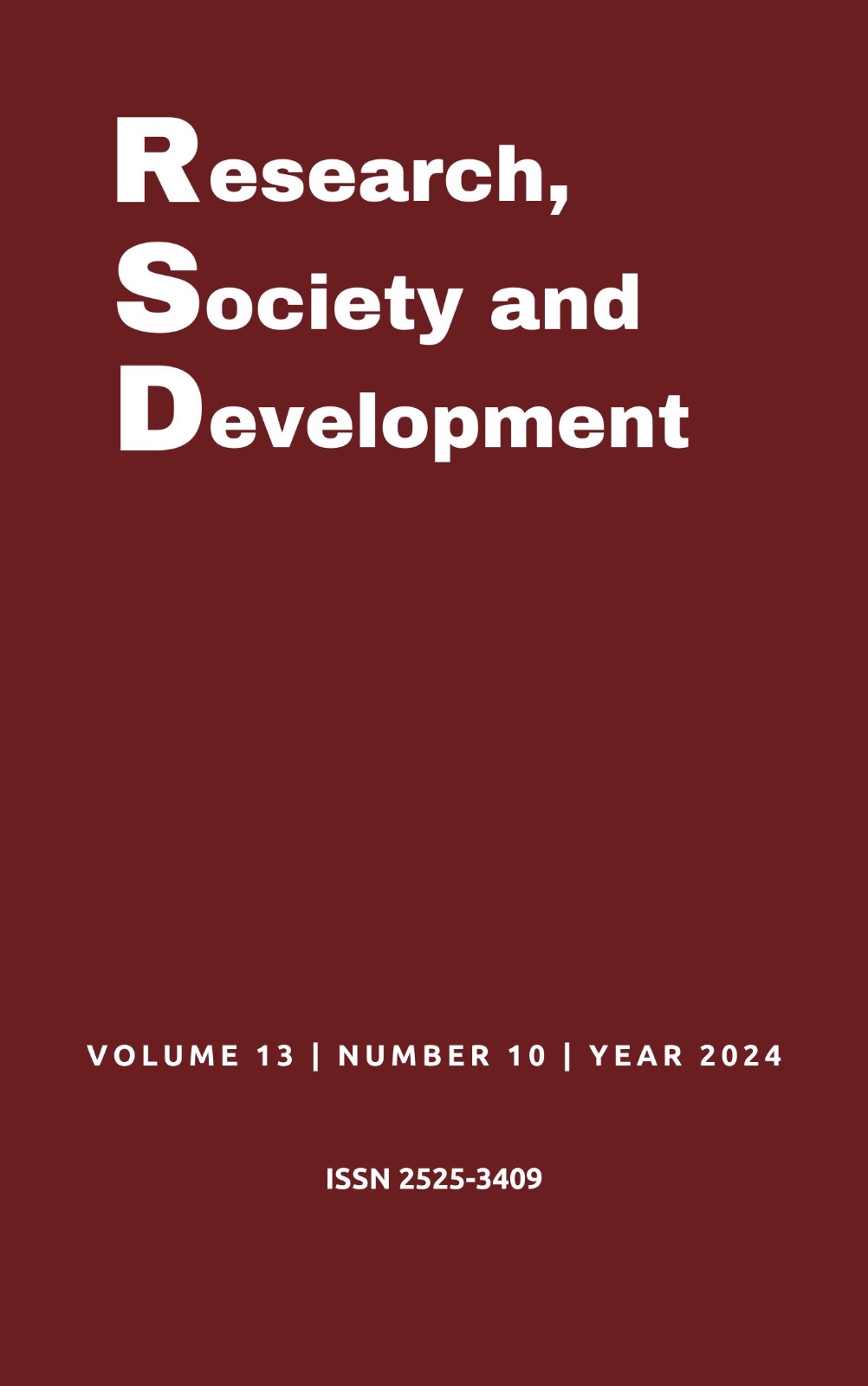The educational product of professional graduate programs: Proposition from the conceptual, pedagogical and communicational axis
DOI:
https://doi.org/10.33448/rsd-v13i10.47068Keywords:
Educational Product, Professional Graduate Program, Professional and Technological Education, Teaching.Abstract
In this article we aimed to present the stages we experienced as researchers to understand the theoretical and practical dimension for the elaboration, application and evaluation of an educational product in the context of a master's program, in the professional modality. To define the educational product, we followed the guidelines contained in the CAPES Teaching Area Document (2019). Thus, we considered that the workshop typology would meet the needs and characteristics of our target audience in a peculiar way. In this way, we idealized an educational product that would provide knowledge to students of the 3rd year of the Technical Course of Informatics Integrated to High School, at the Federal Institute of Santa Catarina, Blumenau Campus, about the existing possibilities for the continuity of the training process at the end of integrated high school. As for the methodological procedure, the present study presents the experience report of a descriptive, documentary and bibliographic research with a qualitative approach. In this way, we have the effective possibility of expanding students' access to knowledge that supports them to continue their training process. This represents significant actions in the lives of many students who seek an EFA institution to expand their opportunities for insertion in the world of work.
Downloads
References
Almeida, I. D. (2021). Metodologia do trabalho científico [recurso eletrônico]. Recife: Ed. UFPE. ISBN 978-65-5962-058-6 (online).https://repositorio.ufpe.br/bitstream/123456789/49435/1/METODOLOGIA%20DO%20TRABALHO%20CIENTÍFICO.pdf
Barros, A. M. D. B. (2024). Manual de trabalhos acadêmico-científicos: relato de experiência. Nova UBM - Centro Universitário de Barra Mansa. Gaia, A. C. A.https://www.ubm.br/explorer/arquivos/manual-ubm-relato-de-experi%C3%AAncia.pdf.
Brasil, CAPES. (2019). Documento de Área – Ensino. Brasília. Requisitos para apresentação de propostas de cursos novos (APCN) (www.gov.br)
Cordeiro, R. V., & Altoé, R. O. (2021). Fatores comunicacionais para elaboração de produtos/processos educativos em Programas Profissionais de Pós-graduação na área de Ensino/Educação em Ciências e Matemática: reflexões emergentes e em movimento. Amazônia: Revista de Educação em Ciências e Matemáticas, 17(39), 253-270.. http://dx.doi.org/10.18542/amazrecm.v17i39.11627
Daltro, M. R., & de Faria, A. A. (2019). Relato de experiência: Uma narrativa científica na pós-modernidade. Estudos e pesquisas em psicologia, 19(1), 223-237. http://pepsic.bvsalud.org/pdf/epp/v19n1/v19n1a13.pdf
Do Amaral Moreira, M. C. et al. ( 2018). Produtos educacionais de um curso de mestrado profissional em ensino de ciências. Revista Brasileira de Ensino de Ciência e Tecnologia. 11 (3), 344-63. 10.3895/rbect.v11n3.5697
Freitas, Rony. (2021). Produtos educacionais na área de ensino da capes: o que há além da forma?. Educação Profissional e Tecnológica em Revista, v. 5, n. 2, p. 5-20. https://doi.org/10.36524/profept.v5i2.1229
Gil, A. C. (2017). Metodologia Científica. Atlas.
Instituto Brasileiro de Geografia e Estatística (IBGE). (2024). Pesquisa Nacional por Amostra de Domicílios: Educação-2023. Rio de Janeiro.
Instituto Nacional de Estudos e Pesquisas Educacionais Anísio Teixeira (INEP). (2023).Censo da Educação Básica 2022: Resumo Técnico. Brasília, DF. notas_estatisticas_censo_da_educacao_basica_2023.pdf (inep.gov.br)
Kaplún, G. (2003)Material Educativo: a experiência do aprendizado. Comunicação e Educação, São 27, p. 46-60, maio/ago. http://www.revistas.usp.br/comueduc/article/view/37491.
Kaplún, G. (2002).Contenidos, itinerarios y juegos. Tres ejes para el análisis y la construcción de mensajes educativos. VI Congreso de ALAIC (Asociación Latinoamericana de Investigadores de la Comunicación). Santa Cruz de la Sierra, Bolivia.
Lüdke, M. & Andre, M. E . D. A. (2013). Pesquisas em educação: uma abordagem qualitativa. E.P.U.
Marconi, M. D. A., & Lakatos, E. M. (2003). Fundamentos de metodologia científica. Atlas.
Mendonça, A. P., Rizzatti, I. M., Rôças, G., & de Farias, M. S. F. (2022). O que contém e o que está contido em um Processo/Produto Educacional?: Reflexões sobre um conjunto de ações demandadas para Programas de Pós-Graduação na Área de Ensino. Educitec-Revista de Estudos e Pesquisas sobre Ensino Tecnológico, 8, e211422-e211422. https://doi.org/10.31417/educitec.v8.2114
Mussi, R. F. D. F., Flores, F. F., & Almeida, C. B. D. (2021). Pressupostos para a elaboração de relato de experiência como conhecimento científico. Revista práxis educacional, 17(48), 60-77. https://doi.org/10.22481/praxisedu.v17i48.9010
Pereira, A. S., Shitsuka, D. M., Parreira, F. J., & Shitsuka, R. (2018). Metodologia da pesquisa científica. [free e-book]. Santa Maria/RS. Ed. UAB/NTE/UFSM. Metodologia da pesquisa científica | Manancial - Repositório Digital da UFSM
Pinheiro, F. F. D. P. S., & Aires, J. P. (2023). Orientações para elaboração de produtos educacionais no mestrado profissional em ensino: exemplificando os tipos de produtos. CONTRIBUCIONES A LAS CIENCIAS SOCIALES, 16(8), 12151-12168.https://doi.org/10.55905/revconv.16n.8-184
Raymundo, G. M. C., Raitz, T. R., & Gesser, V. (2020). Avaliação do processo de ensino e aprendizagem na educação profissional técnica de nível médio. Research, Society and Development, 9(10), e7749109226-e7749109226. https://doi.org/10.33448/rsd-v9i10.9226
Rizzatti, I. M., Mendonça, A. P., Mattos, F., Rôças, G., da Silva, M. A. B. V., de S Cavalcanti, R. J., & de Oliveira, R. R. (2020). Os produtos e processos educacionais dos programas de pós-graduação profissionais: proposições de um grupo de colaboradores. ACTIO: docência em ciências, 5(2), 1-17. 10.3895/actio.v5n2.12657
Downloads
Published
Issue
Section
License
Copyright (c) 2024 Luiz Felipe Santos Queiroz; Gislene Miotto Catolino Raymundo

This work is licensed under a Creative Commons Attribution 4.0 International License.
Authors who publish with this journal agree to the following terms:
1) Authors retain copyright and grant the journal right of first publication with the work simultaneously licensed under a Creative Commons Attribution License that allows others to share the work with an acknowledgement of the work's authorship and initial publication in this journal.
2) Authors are able to enter into separate, additional contractual arrangements for the non-exclusive distribution of the journal's published version of the work (e.g., post it to an institutional repository or publish it in a book), with an acknowledgement of its initial publication in this journal.
3) Authors are permitted and encouraged to post their work online (e.g., in institutional repositories or on their website) prior to and during the submission process, as it can lead to productive exchanges, as well as earlier and greater citation of published work.


